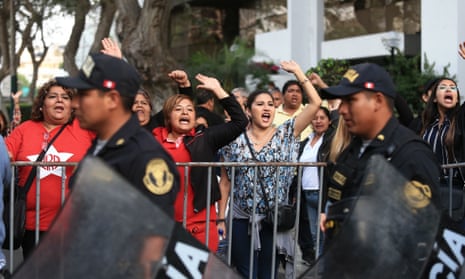Peruvians vote on Sunday in a referendum that could empower a sweeping overhaul of the country’s judiciary and a loathed political class following a string of scandals that have laid bare the corruption at the heart of Peru’s public institutions.
The referendum comes at the end of a year of hitherto unimaginable political upsets beginning when the president Pedro Pablo Kuczynski was forced to resign over corruption allegations in March and followed by the jailing in November of his principal adversary, the powerful opposition leader Keiko Fujimori .
Four former Peruvian presidents are now under investigation for taking bribes from the Brazilian construction company Odebrecht, which has admitted to paying out $30m in Peru – just a fraction of the estimated $800m the firm has admitted to handing out as kickbacks across Latin America, making it the continent’s biggest-ever corruption scandal.
Seeing their political leaders in court (and in Fujimori’s case jailed in preventative detention), would have been unthinkable for most Peruvians – who wearily assumed such figures were untouchable.
But after a series of scandals involving crooked judges and double-dealing politicians, public indignation reached boiling point and the country’s “accidental president”, Martín Vizcarra, has become an unexpected people’s champion.
A low-profile former regional governor, Vizcarra was Kuczynski’s vice-president but has focused on the fight against corruption, a problem that has dominated Latin America’s political agenda.
Sunday’s referendum includes four questions. Voters will be asked if they want to change the skewed system used to appoint judges and prosecutors, to toughen laws on electoral campaign financing – adding criminal penalties – and to limit legislators’ terms by banning immediate re-election to the deeply unpopular congress.
Public disapproval of politicians is so high that a final question to return Peru’s one-chamber legislature to a bicameral system is expected to get a no vote.
“If this government is remembered it will be for fighting against corruption, in theory and in practice, and I stress in practice – because in theory everyone has said they will fight against corruption,” Vizcarra told reporters in October.
Every former president dating back three decades is either being investigated for corruption or has already been jailed, as in the case of Alberto Fujimori, Keiko’s father, whose recently granted medical pardon was revoked in October.
On Monday, Uruguay turned down an asylum request by the two-time former president Alan García, who lived in the ambassador’s residence in Lima for about two weeks pleading “political persecution” after a court barred him from leaving the country. Prosecutors are investigating allegations he took bribes from Odebrecht in his second term, from 2006 to 2011.
Widely reviled since his disastrous first 1985-90 spell, which left the country in economic ruin, García denies accusations he took kickbacks from the firm in return for a contract to build a metro line in Peru’s capital.
